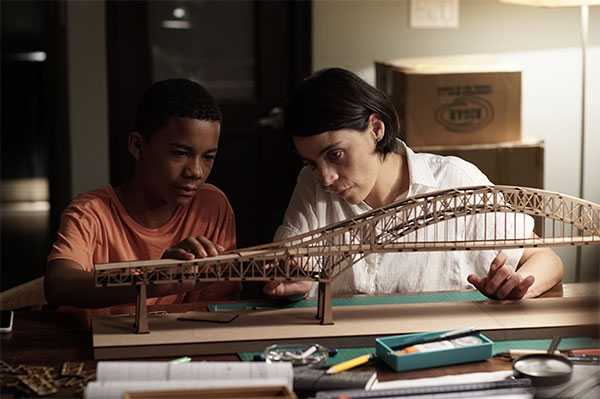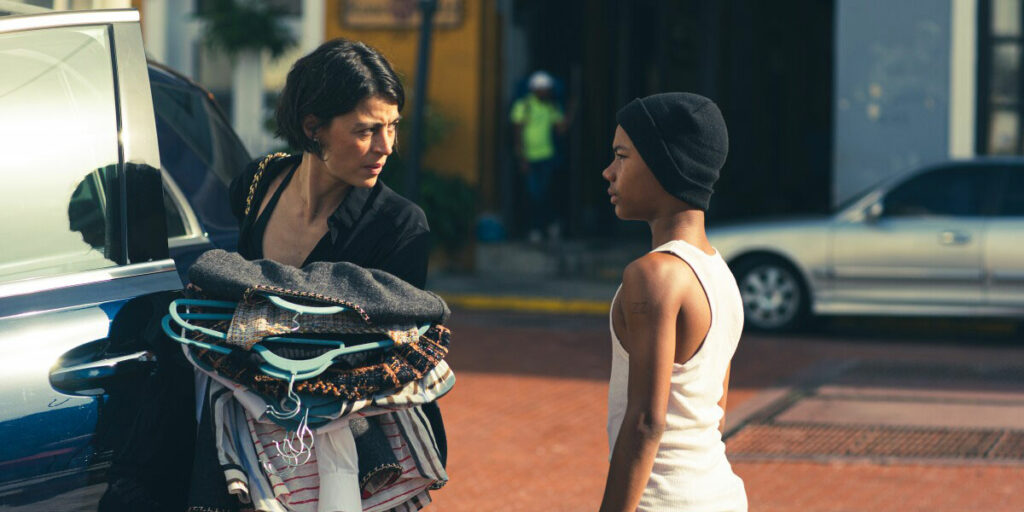Abner Benaim’s Plaza Catedral eschews sentimentality for the harsh realities of street violence with low-key but lofty emotional resonance.
From its dizzying opening shot of a steep ascent up a partially built skyscraper, and Ilse Salas’ voiceover exasperatedly berating those who tell her ‘things will get better’, it’s clear that Abner Benaim’s Plaza Catedral is not particularly sentimental. It’s a film about unlikely connections and social divides that avoids lingering on emotion to focus on the harsh realities of street violence in Latin America.
Alicia (Isle Salas) is grieving the loss of her six-year-old son. She’s recently moved in to a new apartment in Panama City, and has to fend off a youngster she nicknames Chief (Fernando Xavier De Casta) as he heckles her for money for saving her parking spaces, washing her car, and generally just being a nuisance outside her building. But then one night she finds him on her stairs, bleeding from a gunshot wound, and somewhat reluctantly takes him in. The pair form an unlikely friendship as he recovers, but when Chief’s past catches up with them, Alicia comes to understand just how dangerous life is right outside her door.
From the wide panoramic shots showing off the bright scope of the city to the warmth of intimate night-time conversations over tea and rum, Benaim’s film is full of contrasts. Even the cooler neutrals of Alicia’s home firmly contrast with the shoddy, garishly bright ones of Chief’s. It firmly establishes the themes of duality that Benaim is keen to explore; how the city can push for fancy high rise skyscrapers and simultaneously have its streets rife with gang violence.

The relationship between Alicia and Chief is Plaza Catedral’s narrative crux, and the way in which they progress from bickering strangers to something akin to friends feels really authentic. Alicia is devastated after losing her son, and so the emotional transference on to Chief is both heart-breaking and heart-warming. Theirs is a funny dynamic, he makes her smile and she fusses over him, albeit somewhat reluctantly and not very politely. And when contrasted with how they interact with their own families – Chief’s home life is tough, and Alicia’s husband blames her for their son’s accident – it gives their scenes together that poignancy and emotional weight, even if it doesn’t ever become mawkish. Because Benaim isn’t particularly interested in making things sentimental, instead the purpose is to jolt audiences into understanding the severity of Panama’s violence problem.
And if that wasn’t enough, the title card as the film draws to a close that informs us of De Casta’s untimely death, mere months before the film’s release, really adds to the film’s emotional resonance. It’s so tragic because he gives a great performance here, adding depth to Chief that bellies his age. His and Salas’ moments of raw, emotional vulnerability are when the film really lets audiences in on just how much pain the protagonists are carrying around, and so the sombre, low-key mood of the rest of the film makes complete sense. It is a bit wearisome to utilise the ‘rich woman being bettered by the presence of a poorer boy’ trope to tell this story, but Benaim’s reluctance to linger on the moments of sentimentality help it to not feel too contrived.
Plaza Catedral is a film that’s somewhat restrained in its showing of emotion, but doesn’t feel any less powerful as a result. Its protagonists are kindred spirits, healing together, and Benaim’s decision to not provide a definitive conclusion to its shocking final act really emphasises the reality of lives shattered by rampant street violence in Latin America. It’s a film with a compelling central duo that delivers its emotional blows subtly but succinctly, and they linger like a bruise after the credits roll.
Plaza Catedral will premiere at the 2022 UK Jewish Film Festival on 13 November, 2022. The film is currently available to watch on digital and on demand in the US and Panama.

